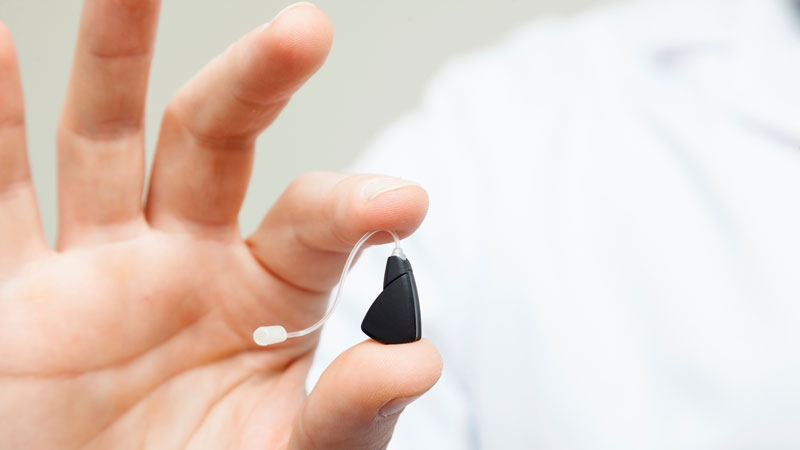
Cochlear Implants
Hearing loss can affect your daily life, but there may be a way to help. Northwestern Medicine offers comprehensive evaluations and procedures for adults who may benefit from cochlear implants. If you have severe hearing loss that cannot be corrected with hearing aids, a cochlear implant may be the answer.
Cochlear Implants for Hearing Loss
Cochlear implants can help provide a sense of sound to patients who are deaf or hard of hearing.
A cochlear implant is placed just underneath your scalp, behind your ear. It can help restore your hearing. This medical device bypasses damaged structures in your inner ear. It stimulates the auditory nerve in your brain, which translates the signals into sound. Hearing with a cochlear implant is different from natural hearing or hearing with the help of hearing aids.
Cochlear implants may also help preserve or restore hearing for people with acoustic neuroma.
Meet the Teams

- About Cochlear Implants
- About Cochlear Implant Surgery
- Candidates for Cochlear Implants
Cochlear implants help provide a sense of sound to patients who are deaf or hard of hearing. They have four main parts:
- Microphone: Picks up sound
- Speech processor: Selects and arranges sounds from the microphone into speech
- Transmitter, receiver and stimulator: Converts speech sounds into electrical impulses to stimulate the auditory nerve
- Electrode array: Collects impulses from the stimulator and sends them to different parts of the auditory nerve
Cochlear implant surgery is typically performed by otolaryngologists and otologists or neurotologists.
Audiologists also play a key role. They provide pre- and post-implantation support, including the initial hearing tests, device programming and rehabilitation.
Cochlear implant surgery is done in a hospital or clinic. Patients get general anesthesia. The surgery typically lasts two to four hours.
In the procedure:
- The surgeon makes an incision behind the ear to open the mastoid bone.
- Then the surgeon makes a small incision in the cochlea.
- The surgeon implants electrodes into the cochlea.
- The surgeon puts an electronic device called the receiver under the skin behind the ear. Then, they close the incision.
- Your care team will move you to the recovery area and watch you closely.
- You may go home the same day or stay overnight.
After you have healed, you will meet with an implant audiologist. They will program the cochlear implant and monitor your progress as you adjust to hearing again.
If needed, you will meet with a speech-language pathologist to maximize your speech and help you understand everyday conversation.
Northwestern Medicine offers comprehensive evaluations for adults who may benefit from cochlear implants. Cochlear implants can help provide a sense of sound if you are deaf or hard of hearing.
The benefits of cochlear implants depend on your condition. Your care team will use diagnostic tests to determine if you are a candidate.
At Northwestern Medicine, there are two steps before you get a cochlear implant:
- Hearing evaluation: Audiologists evaluate your hearing to assess how much you can hear and determine if a cochlear implant would be an appropriate solution. The test simulates real-world conditions, such as:
- Quiet and noisy environments
- Hearing with and without the use of hearing aids
- Consultation: You will get a comprehensive overview of cochlear implants, including:
- Specific instructions
- Explanation of the procedure
- What to expect after surgery
- Potential hearing outcomes
- The best device options for your needs



